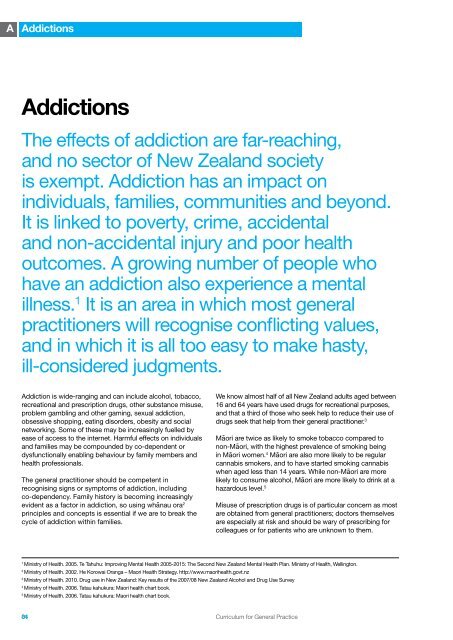Curriculum for General Practice - The Royal New Zealand College ...
Curriculum for General Practice - The Royal New Zealand College ...
Curriculum for General Practice - The Royal New Zealand College ...
Create successful ePaper yourself
Turn your PDF publications into a flip-book with our unique Google optimized e-Paper software.
A Addictions<br />
Addictions<br />
<strong>The</strong> effects of addiction are far-reaching,<br />
and no sector of <strong>New</strong> <strong>Zealand</strong> society<br />
is exempt. Addiction has an impact on<br />
individuals, families, communities and beyond.<br />
It is linked to poverty, crime, accidental<br />
and non-accidental injury and poor health<br />
outcomes. A growing number of people who<br />
have an addiction also experience a mental<br />
illness. 1 It is an area in which most general<br />
practitioners will recognise conflicting values,<br />
and in which it is all too easy to make hasty,<br />
ill-considered judgments.<br />
Addiction is wide-ranging and can include alcohol, tobacco,<br />
recreational and prescription drugs, other substance misuse,<br />
problem gambling and other gaming, sexual addiction,<br />
obsessive shopping, eating disorders, obesity and social<br />
networking. Some of these may be increasingly fuelled by<br />
ease of access to the internet. Harmful effects on individuals<br />
and families may be compounded by co-dependent or<br />
dysfunctionally enabling behaviour by family members and<br />
health professionals.<br />
<strong>The</strong> general practitioner should be competent in<br />
recognising signs or symptoms of addiction, including<br />
co-dependency. Family history is becoming increasingly<br />
evident as a factor in addiction, so using whānau ora 2<br />
principles and concepts is essential if we are to break the<br />
cycle of addiction within families.<br />
We know almost half of all <strong>New</strong> <strong>Zealand</strong> adults aged between<br />
16 and 64 years have used drugs <strong>for</strong> recreational purposes,<br />
and that a third of those who seek help to reduce their use of<br />
drugs seek that help from their general practitioner. 3<br />
Māori are twice as likely to smoke tobacco compared to<br />
non-Māori, with the highest prevalence of smoking being<br />
in Māori women. 4 Māori are also more likely to be regular<br />
cannabis smokers, and to have started smoking cannabis<br />
when aged less than 14 years. While non-Māori are more<br />
likely to consume alcohol, Māori are more likely to drink at a<br />
hazardous level. 5<br />
Misuse of prescription drugs is of particular concern as most<br />
are obtained from general practitioners; doctors themselves<br />
are especially at risk and should be wary of prescribing <strong>for</strong><br />
colleagues or <strong>for</strong> patients who are unknown to them.<br />
1<br />
Ministry of Health. 2005. Te Tahuhu: Improving Mental Health 2005-2015: <strong>The</strong> Second <strong>New</strong> <strong>Zealand</strong> Mental Health Plan. Ministry of Health, Wellington.<br />
2<br />
Ministry of Health. 2002. He Korowai Oranga – Maori Health Strategy. http://www.maorihealth.govt.nz<br />
3<br />
Ministry of Health. 2010. Drug use in <strong>New</strong> <strong>Zealand</strong>: Key results of the 2007/08 <strong>New</strong> <strong>Zealand</strong> Alcohol and Drug Use Survey<br />
4<br />
Ministry of Health. 2006. Tatau kahukura: Maori health chart book.<br />
5<br />
Ministry of Health. 2006. Tatau kahukura: Maori health chart book.<br />
01 34<br />
<strong>Curriculum</strong> <strong>for</strong> <strong>General</strong> <strong>Practice</strong>

















